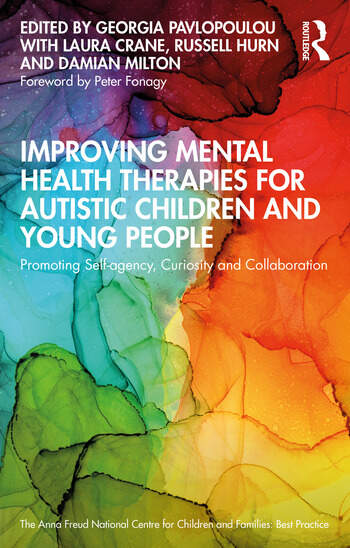Improving Mental Health Therapies for Autistic Children and Young People: Promoting Self-agency, Curiosity and Collaboration

Book Details
- Publisher : Routledge
- Published : 2025
- Cover : Paperback
- Pages : 244
- Category :
Autism and Aspergers - Category 2 :
Child and Adolescent Studies - Catalogue No : 98300
- ISBN 13 : 9781032372525
- ISBN 10 : 1032372524
Reviews and Endorsements
The Editors take a genuinely collaborative approach to an area within the autism field that is often both overlooked and misunderstood. With an autistic-affirmative vibe and deeply embedded in practice transformation, this book will be a valuable addition to any professional genuinely interested in the mental well-being of autistic children and young people.
Dr Luke Beardon, Senior Lecturer in Autism, University of Sheffield, UK
For mental health professionals that are dedicated to supporting autistic children and young people, this is a must-read handbook. With meticulous insight and a compassionate approach, it serves as an invaluable guide, offering practical strategies and nuanced understanding to enhance the therapeutic journey and positive outcomes for autistic individuals. This resource is an indispensable tool for both clinicians and supervisors committed to fostering mental wellbeing within the autistic community.
Freena Tailor, Anna Freud Clinical Associate in Applied Psychology and Programme Director for PG Cert Supervision/ PG Dip Senior Wellbeing Practitioner (SWP) University College London, London, UK
This book meets an outstanding need in improving care for autistic children, young people, and their families. It is a rare and desperately needed resource directly aimed at helping clinicians and practitioners working with autistic children and young people to move professionals away from a deficit-based therapeutic model to a partnership approach, with the voice of autistic people guiding this narrative alongside national experts. A hugely important book for all involved in children and young people’s service delivery.
Dr Lesley French, Consultant Clinical Psychologist & Head of Clinical Help, Anna Freud Schools Division, Honorary Lecturer, UCL, London, UK
A timely and invaluable publication which translates evidence-based mental health research into practical and accessible tools for parents and professionals to inclusively support the celebrated neurodiversity of mental health in autistic children and young people.
Dr Narad Mathura, MBBS, MSc, FRCPCH, Consultant Paediatrics & Child Health, Evelina London Children's Community Services, Guys & St Thomas NHS Foundation Trust
In these times of rapid changes, it is crucial to get the best information available, so I can only encourage mental health professionals and, frankly anybody curious about autism today, to read this practical, comprehensive, neuroaffirmative and wonderfully documented book. Thank you!
Bernadette Grosjean, M.D. RET - Distinguished Fellow of the American Psychiatric Association Associate Professor of Psychiatry, David Geffen School of Medicine at UCLA, Los Angeles, USA
This is an important book written truly in the spirit of co-production that it advocates, with valuable contributions from autistic and neurodiverse professionals and self-advocates. Although the book is written for therapists and other mental health professionals, I found it highly pertinent to my work in paediatric diagnostic services - which is perhaps where autistic and children and young people with other neurodivergencies first encounter health and mental health professionals. Applying the principles covered in this book to the diagnostic process is a valuable opportunity to start these young people and their caregivers on an affirming journey of their diversity. The chapters are highly readable and full of pragmatic ideas that one could use to further enhance the diagnostic and post diagnostic process as a humane, holistic, therapeutic and affirming encounter. This includes ways to improve organizational culture and attitude, clinician competence, communication approaches, setting up the sensory environment and considering the experiences of the extended family (e.g. siblings and caregivers) with all their diversity (neurodiversity, cultural diversity, gender and sexual identify diversity etc.). A deeper understanding of these experiences allows diagnostic clinicians to advise, refer and signpost children, young people and their caregivers effectively.
Dr Ramzi Nasir, MD MPH Consultant Neurodevelopmental Paediatrician, Imperial College Healthcare NHS Trust, London, UK
I thoroughly recommend this excellent book which brings together the perspectives of autistic and non-autistic experts in a highly readable and constructive way in considering the needs of autistic children, young people, and their families. It discounts the deficit model of autism and insists on a collaborative approach to all aspects of the relationships between autistic and non-autistic people. It also provides highly practical, clear advice about the day-to-day experiences of autistic children and their families so that the reader can see how theory translates into very helpful practice.
Dr Peter Fuggle, AMBIT Consultant and Clinical Director of Clinical Services, Anna Freud, London, UK
This magnificently written, breathtakingly comprehensive book is a milestone, offering solid theoretical grounding and practical approaches for making mental health care more accessible to autistic children and young people, while encouraging their autonomy and learning from their insights. The authors are on the front lines of a compassionate transformation in society's understanding of neurodivergent people that is both long overdue and desperately needed.
Steve Silberman, author of NeuroTribes: The Legacy of Autism and the Future of Neurodiversity

